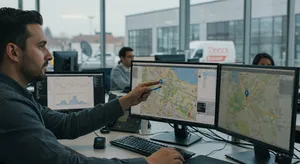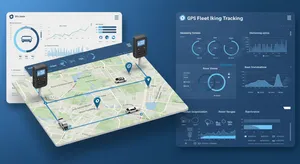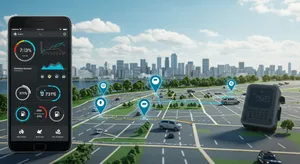Core Tracking Components
- Real-Time GPS tracking capabilities
- Geofencing and boundary monitoring
- Maintenance alerts and scheduling
- Driver behavior analysis
- Route optimization algorithms
This page contains GPS tracking information. Use the table of contents to jump to specific sections. FAQ sections can be expanded using Enter or Space keys.
Commercial fleet tracking solutions drive operational efficiency through real-time monitoring and detailed logistics management. Fleet operators gain actionable insights that directly impact their bottom line through GPS tracking, vehicle diagnostics, and data analytics.
Fleet tracking categories fall into distinct operational areas: vehicle location monitoring, driver behavior analysis, maintenance scheduling, and compliance management.

GPS tracking provide minute-by-minute vehicle location updates and status monitoring. Fleet managers access historical data for route analysis and performance evaluation.

Advanced fleet management systems incorporate AI-driven optimization tools for route planning and resource allocation. Machine learning analyze historical data to predict maintenance needs and prevent vehicle downtime.

Real-time monitoring systems provide instant updates on vehicle location, speed, and status. Alert systems notify managers of critical events such as speeding, harsh braking, or unauthorized vehicle use.

This is where commercial fleet tracking really starts paying for itself. Instead of just knowing where your vehicles are, you start optimizing how they operate to save serious money.

Nobody wants to deal with DOT violations or safety incidents, but they're part of running a commercial fleet. Commercial fleet tracking helps you stay compliant and keep everyone safe without the constant worry.

Data is only useful if you can understand it and act on it. Commercial fleet tracking turns all that tracking information into reports that actually help you make better business decisions.

Your commercial fleet tracking system should work with your existing business tools, not replace them. The best systems integrate seamlessly and adapt to how you actually run your business.

Let's talk about what really matters - how much this costs, how long it takes to set up, and when you'll start seeing your money back. Commercial fleet tracking should pay for itself quickly and keep saving you money.

Commercial fleet tracking is a comprehensive monitoring system designed specifically for business vehicle operations, providing real-time location data, route optimization, and operational analytics.
Commercial fleet tracking works for commercial operations by installing GPS devices in business vehicles that communicate with satellites and transmit location data to centralized management platforms.
The best commercial fleet tracking for commercial fleets offers enterprise-grade features, scalable platforms, comprehensive reporting, and robust customer support.
Commercial fleet tracking costs for commercial use typically range from $40-100 per vehicle per month, depending on features, fleet size, and service requirements.
Most businesses achieve positive ROI within 3-6 months through 15-25% fuel cost reduction, 10-20% overtime decrease, reduced insurance premiums, and increased productivity.
Implementing commercial fleet tracking in commercial operations involves selecting enterprise-grade tracking devices, installing them across the commercial fleet, configuring management software, and training staff on system usage.
Commercial fleet tracking offering the best commercial ROI provides comprehensive tracking features, reliable performance, and measurable cost savings through operational improvements.
Commercial fleet tracking features commercial operations need include real-time tracking, route optimization, driver behavior monitoring, maintenance scheduling, and comprehensive reporting capabilities.
Commercial fleet tracking improves commercial efficiency by optimizing routes, reducing idle time, monitoring driver performance, and providing real-time operational insights.
Commercial fleet tracking can significantly reduce commercial operating costs through fuel savings, improved route efficiency, reduced maintenance expenses, and enhanced productivity.
Commercial fleet tracking helps commercial compliance by automatically recording driver hours, maintaining detailed trip logs, and monitoring vehicle usage for regulatory requirements.
Commercial fleet tracking data available for commercial analysis includes vehicle locations, route history, speed reports, idle time, fuel consumption, and driver behavior metrics.
Commercial fleet tracking can typically be deployed for commercial use within 1-3 weeks, including device installation, system configuration, and staff training.
Support available for commercial fleet tracking systems includes technical assistance, training resources, system maintenance, and dedicated customer service.
Commercial fleet tracking enhances commercial customer service by providing accurate arrival times, enabling proactive delay communication, and optimizing response times.
Commercial fleet tracking can integrate with various commercial business software including CRM systems, accounting platforms, dispatch software, and enterprise resource planning tools.
Commercial fleet tracking is ideal for commercial enterprises due to scalable monitoring capabilities, enterprise-grade reliability, comprehensive data collection, and professional-grade features.
Commercial fleet tracking improves commercial driver management by providing objective performance data, monitoring driving behaviors, and ensuring route compliance.
Commercial fleet tracking security features protecting commercial assets include real-time monitoring, theft alerts, geofencing notifications, and emergency response capabilities.
Commercial fleet tracking provides commercial operational insights through detailed analytics, performance metrics, and trend analysis.
Commercial fleet tracking maintenance features helping commercial operations include automated maintenance scheduling, vehicle health monitoring, service reminders, and maintenance history tracking.